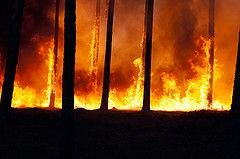Climate change effects on rural fires in Portugal
April 11, 2014

Since 1980 an area equivalent to 3/5 of the forested surface in Portugal has burned. The burnt areas in July and August account for 71% of the total burnt area in Portugal. The interannual variability of burnt area in Portugal is largely determined by 2 different atmospheric factors, namely (1) the amount of precipitation during spring (i.e. in the pre-fire season) and (2) the occurrence of atmospheric circulation patterns that induce extremely hot and dry spells over western Iberia throughout the summer season (i.e. throughout the fire season).
Projections of the impact of climate change in Portugal (based on a Global Climate Model and the IPCC emission scenario B1) indicate that the mean burnt area in July and August may increase by 7 and 11% for the periods 2051−2080 and 2071−2100, respectively, when compared with the period 1980−2011. The standard deviation for these data are projected to decrease by 32% for 2051−2080 and stay the same for 2071−2100. These results thus point towards an increasing risk of fire under future climate conditions, and an increasing likelihood of much larger burnt areas.
Source: Pereira et al., 2013. Climate Research 57: 187–200
Photo: Ervins Strauhmanis (www.flickr.com)




